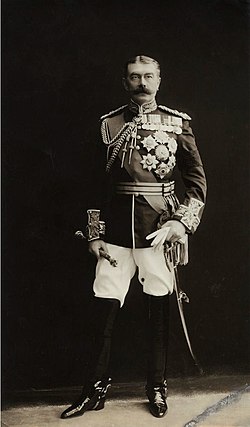Lord Horatio Herbert Kitchener
Franco-Prussian War
Mahdist War:
Field Marshal Horatio Herbert Kitchener, 1st Earl Kitchener, KG, KP, GCB, OM, GCSI, GCMG, GCIE, PC (/ˈkɪtʃɪnər/; 24 June 1850 – 5 June 1916), was a senior British Army officer and colonial administrator who won notoriety for his imperial campaigns, most especially his scorched earth policy against the Boers and his establishment of concentration camps during the Second Boer War, and later played a central role in the early part of the First World War.
Kitchener was credited in 1898 for winning the Battle of Omdurman and securing control of the Sudan for which he was made Lord Kitchener of Khartoum, becoming a qualifying peer and of mid-rank as an Earl. As Chief of Staff (1900–02) in the Second Boer War he played a key role in Lord Roberts' conquest of the Boer Republics, then succeeded Roberts as commander-in-chief – by which time Boer forces had taken to guerrilla fighting and British forces imprisoned Boer civilians in concentration camps. His term as Commander-in-Chief (1902–09) of the Army in India saw him quarrel with another eminent proconsul, the Viceroy Lord Curzon, who eventually resigned. Kitchener then returned to Egypt as British Agent and Consul-General (de facto administrator).
...
Wikipedia

